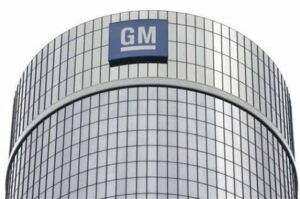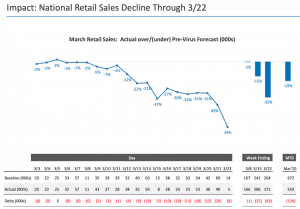This story has been updated with additional information.
The quick decline of new vehicle sales in March has unexpected silver lining for two of the Detroit Three automakers: a jump in market share for the first quarter.
Edmunds.com analysts believe that March auto sales will be down 35.5% from the year-ago period due to the coronavirus pandemic, and a 23.4% drop compared with last month. However, it appears foreign automakers, especially Nissan, appear to be the hardest hit.
The result has been sizable market share increases by General Motors from 16.6% to 18%, an 8.5% jump. Fiat Chrysler followed suit, seeing its share rise from 12.4% to 13.1%, which is good for a 5.5% increase for Q1. Ford was caught out of the improvement, its share falling 2.5% from 14.7% to 14.3%.
(Lease prices decline as coronavirus outbreak expands.)
Other automakers seeing share gains during Q1, according to Edmunds, included Hyundai/Kia (7.2%), Toyota (3.6%) and VW/Audi (0.6%). As noted, Nissan saw its share fall double digits – 18.8% – on a year-over-year basis.
Edmunds experts note that the downturn in March will also lead to a drop in quarterly sales, forecasting that 3,546,415 new cars and trucks will be sold in the first quarter of 2020, which reflects an 11.8% decrease from the first quarter of 2019.
Unsurprisingly, Nissan is expected to see the biggest decline at 28.5%, followed by Honda (16.7%), Ford (14.1%) and VW/Audi (11.2%).
“The first two months of the year started off at a healthy sales pace, but the market took a dramatic turn in mid-March as more cities and states began to implement stay-at-home policies due to the coronavirus crisis, and consumers understandably shifted their focus to other things,” said Jessica Caldwell, Edmunds’ executive director of insights.
“The whole world is turned upside down right now, and the auto industry is unfortunately not immune to the wide-ranging economic impacts of this unprecedented pandemic.”
Jonathan Smoke, Cox Automotive’s chief economist, noted that new retail vehicle
sales declined 24% from the prior week and were down 29% year over year. Used vehicle sales saw a decline of 29% from its big jump the prior week and were down 19% year over year. “Our leading indicators point to more declines ahead,” he said in his weekly automotive summary.
(Facing sales collapse, wave of repos, automakers reach out to consumers.)
Part of this is because automaker’s may not be overly inclined to roll out big incentives to try to draw buyers into showrooms right now — many states have restricted movement of its citizenry to just essential trips, such as going to the grocery store. However, the analysts believe that will change as the COVID-19 crisis continues to evolve.
“Automakers can count on capturing some deferred demand once we get past the worst of this pandemic, but since they’ll be competing with so many other companies for consumer spending at that point, they’re really going to need to create incentives to spur some sales,” said Caldwell.
“Things might look a bit bleak as automakers are taking a hit right now across the board, but the massive stimulus package deal that was just announced is an encouraging update. History has shown us that this industry can survive through almost any financial or natural disaster, and we’re confident that they’re going to come out of this tough period on the other side.”
J.D. Power PIN Network, which gets real-time data from dealers as they complete their sales transactions, shows that the sales decline began slowly at the beginning of the month, but then accelerated March 20. Sales were down 31% for that day, but then as several states implemented more stringent orders, such as shelter in place, daily sales dropped 64% on March 22.
Smoke believes the recovery will be “shaped like a V or a U” with a steep and quick decline, followed by a similar but opposite recovery in the U.S. due to pent-up demand. However, the global outlooks is much different, according to IHS Markit analysts.
The global auto industry is expected to witness an unprecedented and almost instant stalling of demand in 2020, with global auto sales forecast to plummet more than 12% from 2019, to 78.8 million units, according to the latest IHS Markit forecasts.
This represents a downgrade of 10 million units compared with pre-coronavirus forecasts in January 2020. A fall of 12% for 2020 would be considerably worse than the two-year peak-to-trough decline of 8.0% during the global recession in 2008/2009.
Globally, the picture looks different: a sharp reduction in near-term growth followed by a slow recovery. Risks are heavily skewed to downside; especially how low the market could go and for assessing recovery prospects, IHS notes.
(U.S. car sales verging on Great Recession-level collapse.)
Market prospects are mixed, with emerging glimmers of hope for China, though vulnerable to the risk that the virus flares up in the coming months. Government action is key to both controlling the virus and providing support and stimulus packages to help economies through the healing process.





